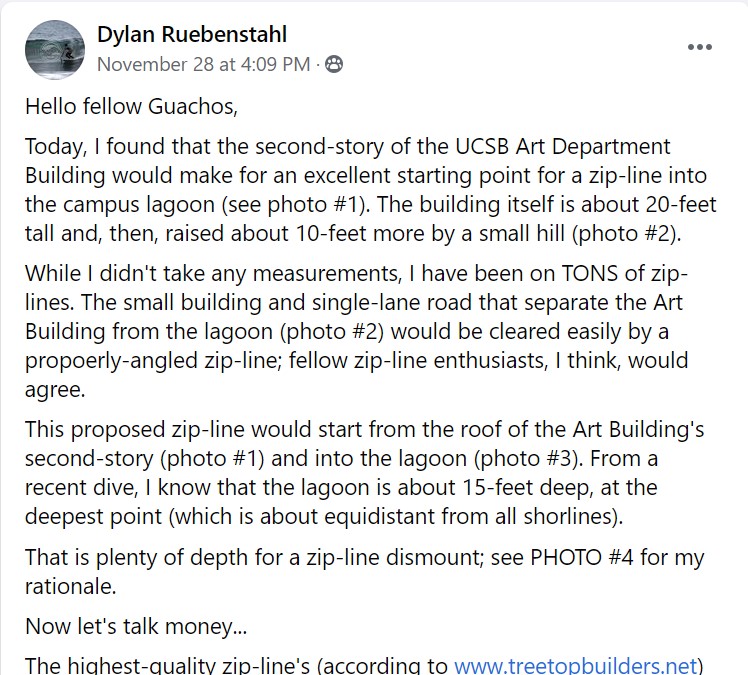Alexandra Wishowski
Isla Vista Beat Reporter
From kayaking to rock climbing, and now perhaps even zip lining, students at the University of California have been able to participate in a variety of recreational activities on campus.
Recently, UC Santa Barbara (UCSB) student Dylan Ruebenstahl posted a proposal for a zip line on the Facebook group, Free & For Sale (UCSB), after discovering that the second story of the Art Department building would be a fitting starting point. The proposed zip line would extend all the way to the campus lagoon.
Ruebenstahl, a fourth-year film and media studies major, sat down for an interview with The Bottom Line to further explain why UCSB would benefit from installing a zip line on campus.
While he has not yet reached out to any departments or administrators on campus, Ruebenstahl has assembled interested students of varying academic backgrounds and recreational experiences, calling them “the ultimate zip line dream team.”

Ruebenstahl has had some difficulty being taken seriously for the project and received many Facebook comments talking poorly of his proposal, but many people have also messaged him to reach out about his vision for the zip line.
“Some have been really helpful and others have just been plain rude,” he said.
A zip line on a university campus is not a brand new idea. Syracuse University’s Department of Recreation Services has a dual zip line open to the public as part of its Challenge Course, which has been used for personal development and team-building activities.
According to Ruebenstahl’s proposal, the expenses of building the zip line are less than 0.01 percent of the revenue UCSB receives from in-state student tuition, meaning it would be a particularly small investment for the school. International and out-of-state students also continue to pay full tuition for online classes.
At most, he estimates that the cost would be $8,000 based on the Tree Top Builders Inc. website, which is a construction company specializing in treehouses and other custom made structures attached to trees. The company’s starting price for a zip line is $2,000.
“Seeing that we are paying full tuition for online school, with so many facilities going unused and that UCSB doesn’t have to power, it would be crazy to think we couldn’t get $8,000 for a zip line,” said Ruebenstahl.
In terms of safety, Ruebenstahl claims in his proposal that he is familiar with the procedures and risks after having several experiences on a zip line. Tree Top Builders Inc. recommends the use of safety equipment such as helmets and harnesses.
While zip lines are not federally regulated in the United States, California’s Division of Occupational Health and Safety sets guidelines for compliance with safety standards for commercial zip line owners and operators. Research conducted at Ohio State University also concluded that only about 12 percent of zip line injuries result in a hospitalization.
Ruebenstahl elaborated on the many potential benefits that a zip line could provide for student life at UCSB. Besides serving as a way to relieve stress for mental health initiatives, it is “a great project for engineer and physics students to collaborate on.”
“Also it would require a staff to work it, thus creating student jobs,” he added.
Ruebenstahl encourages students who would like to collaborate on the zip line idea to reach out to him, especially physicists, mechanics, and graphic designers.












I think UC Santa Barbara (UCSB) student Dylan Ruebenstahl’s Proposes of Zip Line is a great idea. Best wishes for him.
Thank you for sharing the informative post.
Great
Nyc
Great
Great article!!
Awesome!!
Comments are closed.